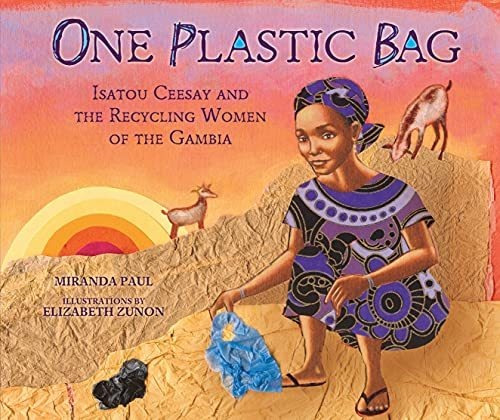Book : One Plastic Bag Isatou Ceesay And The Recycling Wome
Disponible 15 días después de tu compra
MercadoLíder | +10mil ventas
MercadoLíder Platinum
+10mil
Ventas concretadas
Brinda buena atención
Medios de pago
Hasta 12 cuotas sin tarjeta
Tarjetas de crédito
Tarjetas de débito
Efectivo



Descripción
- ANTES DE COMPRAR PREGUNTE FECHA DE ENTREGA.
- ENVIAMOS POR MERCADOENVIOS
- PUEDE RETIRAR POR AHORA SOLO POR QUILMES, MICROCENTRO ESTA CERRADO, POR ESO...
- EN CABA (CAPITAL FEDERAL) ENVIAMOS SIN CARGO ESTE PRODUCTO.
- FORMA DE PAGO : MERCADOPAGO
- HACEMOS FACTURA A.
- ELBAZARDIGITAL VENDEDOR PLATINUM
- TODOS NUESTROS PRODUCTOS EN:
https://eshops.mercadolibre.com.ar/elbazardigital
-X-X-X-
- SOMOS IMPORTADORES DIRECTOS, ESTE PRODUCTO SE COMPRA Y SE IMPORTA DESDE ESTADOS UNIDOS, ESTO IMPLICA QUE USTED ESTA COMPRANDO EL MISMO PRODUCTO QUE COMPRARÍA UN CLIENTE DE ESE PAÍS.
- ANTES DE REALIZAR UNA CONSULTA, VISUALICE TODAS LAS IMAGENES DEL PRODUCTO.
Descripción provista por la editorial :
About the Author Miranda Paul is the award-winning author of more than a dozen books for children, including One Plastic Bag and Boston Globe-Horn Book Honoree Nine Months Before a Baby Is Born. Miranda is a founding member of We Need Diverse Books and serves as its mentorship chair. Learn more at mirandapaul .Elizabeth Zunon grew up in the Ivory Coast, West Africa, and memories of her childhood can be seen in her artwork. She currently lives in Albany, New York. Find her online at lizzunon . The inspiring true story of how one African woman began a movement to recycle the plastic bags that were polluting her community.Plastic bags are cheap and easy to use. But what happens when a bag breaks or is no longer needed? In Njau, Gambia, people simply dropped the bags and went on their way. One plastic bag became two. Then ten. Then a hundred. The bags accumulated in ugly heaps alongside roads. Water pooled in them, bringing mosquitoes and disease. Some bags were burned, leaving behind a terrible smell. Some were buried, but they strangled gardens. They killed livestock that tried to eat them. Something had to change. Isatou Ceesay was that change. She found a way to recycle the bags and transform her community. This inspirational true story shows how one persons actions really can make a difference in our world. From School Library Journal Gr 1-4-The simple format of this picture book belies the strength of its content, a story lovingly supported by charming collage illustrations. As a girl, Ceesay realized that the goats on which her village relied were dying because they were eating plastic bags. She also saw that people were tossing the used bags on the ground just as they had always thrown away their baskets when no longer useful-except the plastic bags, unlike the baskets, werent biodegradable. So Ceesay figured out how to use crochet, a skill with which the villagers were already familiar, to make purses out of the plastic bags. Simple but lyrical text conveys this beautiful, thought-provoking tale of ecological awareness and recycling (The basket tips. One fruit tumbles. Then two. Then ten.). An inspiring account.-Dorcas Hand, Annunciation Orthodox School, Houston, TX Review The simple format of this picture book belies the strength of its content, a story lovingly supported by charming collage illustrations. As a girl, Ceesay realized that the goats on which her village relied were dying because they were eating plastic bags. She also saw that people were tossing the used bags on the ground just as they had always thrown away their baskets when no longer useful except the plastic bags, unlike the baskets, werent biodegradable. So Ceesay figured out how to use crochet, a skill with which the villagers were already familiar, to make purses out of the plastic bags. Simple but lyrical text conveys this beautiful, thought-provoking tale of ecological awareness and recycling (The basket tips. One fruit tumbles. Then two. Then ten.). An inspiring account. starred, School Library JournalAs Isatou Ceesay, a young woman in Njau, Gambia, drops and breaks the basket of fruit she is carrying, she discovers an abandoned bag made of a strange fabric plastic. At first these brightly colored bags seem convenient throughout the village, but as they break, they are discarded. As 1 becomes 2, then 10, then 100, their beauty turns into a growing pile of filth that attracts dirty water, mosquitos, and a stench. When the problem worsens as goats begin to eat the bags and die, Isatou and her friends devise a clever plan thats initially met with ridicule. They wash the bags, cut and roll them into plastic thread, and crochet them into purses, all in secret. But when 1, then 2, then 10 women buy them, proud entrepreneur Isatou soon has enough money to buy a new goat and relishes the returned beauty of her village. Colorful textured and patterned collage artwork illustrates
-o-o-o-
Garantía del vendedor: 90 días
Preguntas y respuestas
¿Qué querés saber?
Preguntale al vendedor
Nadie hizo preguntas todavía.
¡Hacé la primera!

